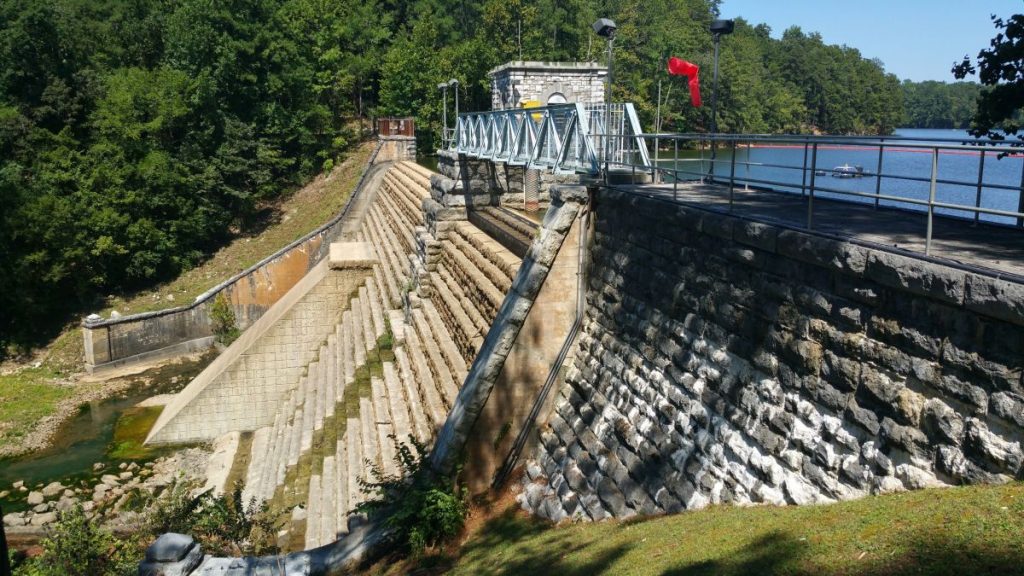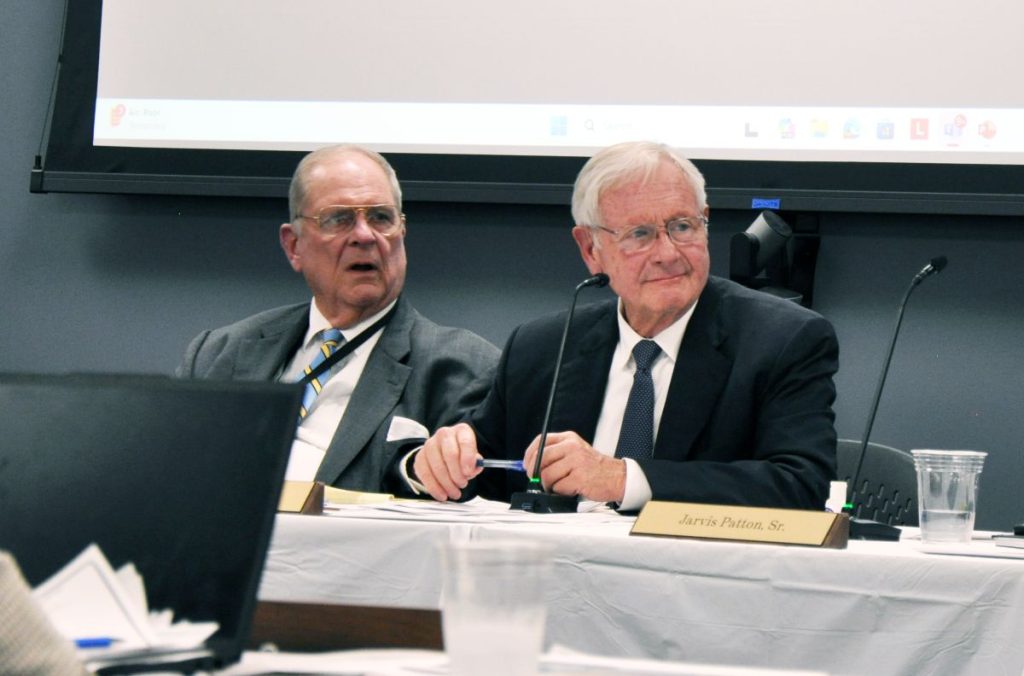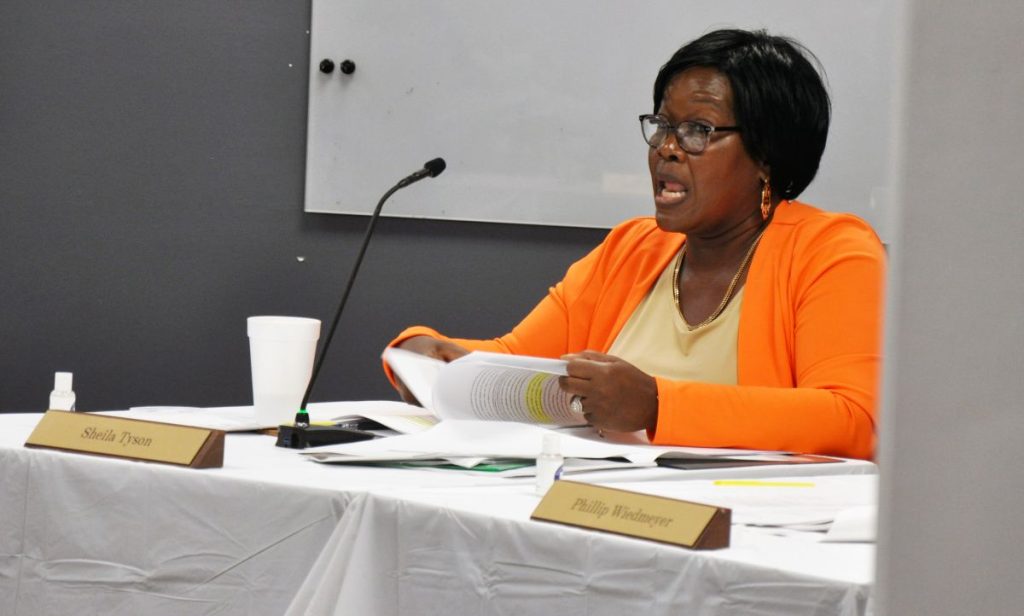City of Birmingham Regional Water Works
Water Works Board OKs Completing Phase 1 of Purdy Dam Stabilization

Donate today to help Birmingham stay informed.
Birmingham’s regional water works board voted Monday to continue the first phase of a project started in November to stabilize Lake Purdy Dam. Work had been halted while the new board, which convened for the first time in May, considered the dam’s structural integrity and ways to pay for the rehabilitation project.
At the City of Birmingham Regional Water Works board’s work session last week, engineers brought up concerns about the dam’s strength and warned lives and thousands of homes could be lost if it failed. After the board emerged from a 40-minute executive session on Monday, however, board member Phillip Wiedmeyer, a retired engineer who was involved in dam-safety inspections during his career with Alabama Power, said the dam doesn’t pose an immediate threat.
“We are certainly concerned about the safety of the public and are not going to take any action that would jeopardize that,” Wiedmeyer said. “There are some outstanding questions related to exactly how we’re going to finance this, and we will figure that out, but at this time, I think it’s prudent that we move forward with the work that’s underway on phase one of the project.”
Wiedmeyer also downplayed a 2023 flood study he brought up last week that showed the dam wouldn’t be stable under the conditions in the study.
“It was an extreme, extreme event – probably a storm that would only occur once every 500,000 years,” he said.
Patrick Flannelly, senior vice president for Arcadis North America, the water works’ engineering consulting firm, told the board last week the dam is not safe enough based on national best practices for dam safety.
Wiedmeyer last week laid out two other problems with the dam: underground water seepage and a foundation made primarily of limestone, which dissolves in water.
The board was to consider two options: halting the project, at a cost of approximately $10 million in contract-termination fees, or completing the initial phase at a cost of $28 million.
The first phase, now scheduled for completion in mid-January, involves using roller-compacted concrete to construct buttresses, which are structural supports, on the downstream side of the dam to increase its strength.
After that, Wiedmeyer said, he hopes the board can move forward with the rest of the project, which was originally slated to take four years. “We’ll see where we are at that point, both financially and from an engineering standpoint,” he said.
When the previous water works board approved the $88 million project in September, it was supposed to be financed with bonds and a loan of up to $171 million through the federal Water Infrastructure Finance and Innovation Act.
Wiedmeyer said financing through the bond market is no longer possible because of a lawsuit city of Birmingham officials filed to block implementation of a state law passed by the Legislature earlier this year that restructured the board, giving suburban areas more representation.
“There’s not an underwriter that will underwrite any financing with a governance cloud hanging over this organization that is precipitated by a lawsuit filed by the city,” Wiedmeyer said.
Wiedmeyer and board member Tommy Hudson said last week they were worried about how the WIFIA loan’s repayment schedule, which could result in total costs of $500 million, would affect customers’ water rates. Mac Underwood, general manager of the water works, said during the work session that staff had inquired about whether the repayment terms could be modified. An answer to that question was not presented at Monday’s meeting.

New Bylaws Adopted, Officials Elected
The board also approved new bylaws Monday to conform to the new state law. Proposed bylaws drafted by one of the water works’ external attorneys, Shan Paden, were presented to board members before last week’s work session.
During the work session, board member Sheila Tyson said she disagreed with several provisions in the proposed bylaws, including limits on board members’ speech, allowing board meetings to be held in counties besides Jefferson and restrictions on public speakers.
The bylaws state that board members can speak on a specific subject no more than twice and for no more than three minutes, unless those rules are waived. The bylaws allow public comments during meetings but require those interested in speaking to register and limit their remarks to three minutes. No more than two spokespersons can speak on a given topic.
The board also Monday elected Hudson as its chair and Wiedmeyer as its vice chair. Hudson was the only board member to accept a nomination for chair. In addition to Wiedmeyer, board member Jarvis Patton Sr. also accepted a nomination for vice chair. Patton and Tyson, the only two board members appointed by Birmingham city officials, voted for Patton, in opposition to the rest of the board.
The board also authorized a search for a chief executive officer of the water works, a position required by the new state law. Hudson appointed himself, Wiedmeyer and board member David Standridge as a committee to conduct the search.
Tyson questioned why she and Patton were not asked to serve on the committee.

“So what you’re going to do is appoint everybody to a committee except Patton and Tyson,” Tyson said. “How do you know we are not qualified? I see exactly what you’re doing. We’re just going to be shut out. We just might as well not come to the meetings.”
Hudson replied: “The exclusion of anyone is not an indication that they’re not considered qualified.”
The board also voted Monday to:
- Approve payment of three invoices for legal and financial services. Patton and Tyson voted against paying an invoice from Capell & Howard P.C., the law firm representing the board in the lawsuit city of Birmingham officials filed. At the board’s work session last week, Patton and Tyson questioned the law firm’s submission of an invoice of $53,608 for work done prior to the board’s vote on June 24 to hire the firm. James Porter II, another external attorney for the water works, said Capell & Howard began representing the five board members originally named in the suit — all those except Tyson and Patton — the day the city filed the suit, and the board’s vote to hire the firm entailed taking on the bill for that prior representation of individual board members.
- Extend on a month-to-month basis a contract with Landscapes Unlimited of Alabama for landscape services throughout the water works’ distribution system, effective Aug. 1.
- Approve an estimated cost of $51,973 for WSP USA Environmental and Infrastructure Inc. to perform geotechnical exploration services, construction materials testing and asphaltic concrete coring services in relation to the water works’ main pipeline replacement project in Birmingham’s Sandusky community.


